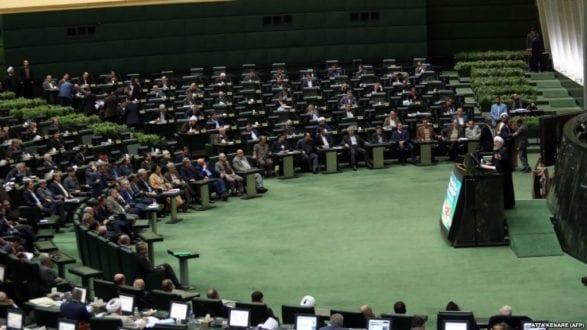Al-Monitor – A controversial bill in the Iranian parliament seeks to ban its members from running for office after serving three consecutive terms. Under the new bill, high-profile moderates such as current parliamentary speaker Ali Larijani and outspoken lawmaker Ali Motahari, who have both served three consecutive terms, would not be eligible to run in the 2020 legislative elections.
On March 3, parliament passed the bill, with 135 members voting in favor. The bill also stipulates that after a period of four years, the ban is lifted and the individual may again run for parliament. To become law, the bill must now be approved by the Guardian Council, and the powerful body hasn’t stated its position yet.
Based on this bill, 34 current parliamentarians will be forbidden from running in the 2020 parliamentary elections. A number of Reformists and conservatives opine that this bill isn’t in line with the constitution, as it limits the people’s right to choose their preferred candidates.
He said, “[Based on] the constitution, the people’s will must not be stalled. If the parliamentarians really care about the country and the people, it is better for them … not to limit people’s right to choose.”
Meanwhile, one hard-line outlet argued that “opponents state that the constitution doesn’t allow restrictions to be applied against the people’s [right] to choose their parliamentarians.” It added that the Iranian Constitution doesn’t let a president run the country for three consecutive terms.
Opponents of the bill believe it will prevent parliament from having efficient and experienced parliamentarians, while supporters believe the bill will create huge opportunities for the young generation to enter parliament.
Hamidreza Taraghi, a former hard-line parliamentarian, told a local media outlet, “[Banning] the experienced parliamentarians will deliver irreparable blows against the legislative [process].”
Conservative parliamentarian Mohammad Reza Bahonar, who has served seven terms, noted that “if this [bill] is turned into a law, it will empty our parliament of experience.” However, Hassan Nowruzi, a hard-line parliamentarian who voted for the bill, emphasized that the parliamentarians can still be elected for three consecutive periods, which will make them experienced enough.
Is this bill designed to force influential figures out of parliament?
After the bill passed, hard-line parliamentarian Seyed Hossein Naghavi Hosseini, took a swipe at Larijani, saying, “God willing, it is your last term and you should take a rest in the next [election].” Larijani replied sarcastically, “You will [have the opportunity] to take a breath.” It should be noted that Larijani has backed moderate President Hassan Rouhani over the past six years, especially during the nuclear talks and the passing of the Joint Comprehensive Plan of Action. This support has transformed the once conservative politician into a hated figure among conservatives and hard-liners.
The hard-liners’ jubilation over the prospect of Larijani not being able to run for reelection raised questions about the motivations behind the bill. Rasoul Montajebnia, a senior Reformist figure, told a local news outlet, “It is likely that there is a hidden political aim behind this bill, which seeks to deprive a number of prominent figures who can manage the parliament well from being nominated.”
Hassan Kanani Moghaddam, a moderate political activist, stated that the hard-liners are seeking revenge on Larijani.
Meanwhile, one analysis is that the bill is the result of a secret agreement between hard-liners and Reformists, as a number of Reformists, including Mohammad Reza Aref, the chairman of the Hope faction in parliament, would benefit from this bill. Hard-line SNN news outlet wrote that removing Larijani from parliament would please Aref more than anyone.
Nonetheless, it is likely that such an agreement was made, as a number of hard-liners and Reformists reached a deal in 2018 to bring down Larijani. In 2018, when parliament voted on a speaker, some hard-line parliamentarians voted for Aref in a coordinated plan to take down Larijani. However, they failed, as Larijani obtained only 24 votes more than Aref, which was alarming for him.
Moderate Ali Motahari is among the prominent parliamentarians who would have to say farewell to parliament if the Guardian Council approves the bill. If passed, figures like Larijani and Motahari would likely focus on other endeavors, such as potentially running in the 2021 presidential election.
In response to a question about the possibility of his nomination in the next presidential election, Motahari, in an unprecedented move, did not dismiss the notion.
In an interview with a local outlet, Motahari stated: “It is dependent on the situation. I myself didn’t think that one day I would enter the parliament, because I assumed that it wasn’t compatible with [my character]. Sometimes I listened to the parliament [sessions] on the radio, and I said to myself, how patient they are, sitting there and discussing issues.”
Since Reformists will likely not be able to bring out their supporters to the polls, due to their constituents’ disappointment over the Reformist performance in parliament, the bill would benefit hard-liners and conservatives, as their key rivals would be excluded from the elections. The path, then, is set for the new generation of hard-liners to enter parliament, since many hard-liner and conservative constituents see voting as a “religious duty.” Under such circumstances, it’s possible that conservatives like Mohammad Bagher Ghalibaf, who has ran for president three times, will be nominated to be the next parliamentary speaker.Found in:INSTITUTION BUILDING
Rohollah Faghihi is a journalist who has worked for various Iranian media outlets. On Twitter: @FaghihiRohollah
 Shabtabnews In this dark night, I have lost my way – Arise from a corner, oh you the star of guidance.
Shabtabnews In this dark night, I have lost my way – Arise from a corner, oh you the star of guidance.



